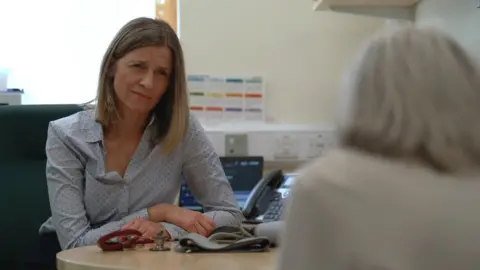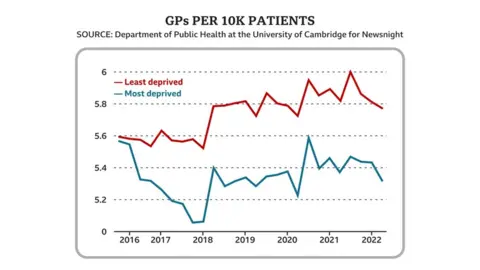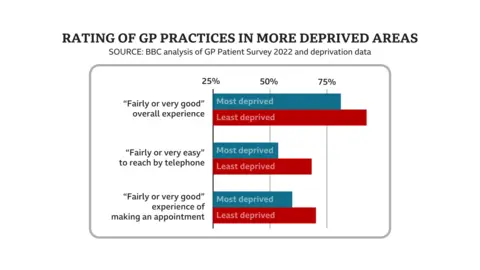Poorer areas in England suffer most from GP shortage, study finds
 BBC
BBCThe gap between the number of GPs per patient in richer and poorer parts of England is widening, according to analysis by University of Cambridge.
The study for BBC Newsnight saw "stark inequalities" in GPs' distribution.
Separate BBC research also found patient satisfaction on measures such as how easy a practice is to reach by phone is lower in deprived areas.
The Department of Health and Social Care said it was focusing support on those who need it most.
Earlier this year, public satisfaction with GP care - as measured by the British Social Attitudes poll - fell to its lowest level across England since the survey began in 1983.
The fall was widespread across all income groups.

But the BBC analysis, which mapped national deprivation data against the results of the latest GP Patient Survey, suggests satisfaction levels are lower in more deprived areas.
The finding chimes with a Health Foundation analysis of official checks on the quality of services carried out by the Care Quality Commission (CQC).
It found practices serving patients living in the most deprived areas are more likely to receive CQC ratings of "inadequate" and "requires improvement" than those serving patients who live in the most affluent areas.
For example, many people living in Blackpool, which has eight of the 10 most deprived neighbourhoods in England, had a story of being let down.
A common complaint is how difficult it is to reach a practice on the phone, and the data suggests those in more deprived areas have a worse experience.
Dr Susan Green, who has worked in Blackpool since 2009, said: "It is so devastating to be told that you're the problem."
She says there are not enough doctors to meet the demand from patients.
"That's a really hard thing to reconcile. You want to be able to help everyone that needs it, but you simply can't."
Dr Green's practice has fewer doctors than in 2015, but the patient list has grown from 8,500 to 11,600.

Nationally, the number of GPs per patient has fallen for all practices, but the new Cambridge analysis found the situation had deteriorated most in deprived areas since 2015.
"If we look over the past seven years, practices in richer areas have gained on average about one day a week of additional GP time," says Dr John Ford, clinical lecturer in public health at the University of Cambridge.
"Whereas practices in poorer areas have actually lost about a day and a half of GP time per week."
A spokesperson for the Department of Health and Social Care said its policies "will improve access to general practice across the country, including in the most deprived areas".
In a statement they added: "We're also focusing support on those that need it most - NHS England will be working with up to 400 practices this year to deliver care to patients in the most deprived areas.
"We made £520m available to improve access and expand general practice capacity during the pandemic, in addition to at least £1.5bn announced in 2020 to create an additional 50 million general practice appointments by 2024, by increasing and diversifying the workforce."
Additional reporting by Charlotte Rowles and Emily O'Sullivan.
